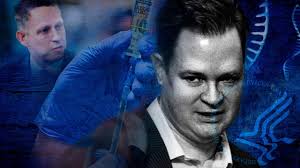
Breaking News
 JUST IN: Tulsi Gabbard Confirmation Advances Through Senate Intel Committe
JUST IN: Tulsi Gabbard Confirmation Advances Through Senate Intel Committe
 Super Bowl 59: NFL to Remove 'End Racism' Slogan From End Zones...
Super Bowl 59: NFL to Remove 'End Racism' Slogan From End Zones...
 Senate Votes 54-46 to Confirm Pam Bondi as US Attorney General
Senate Votes 54-46 to Confirm Pam Bondi as US Attorney General
 More Victims of Obama/Biden Persecutions Remain Hopeful to Receive Trump Pardons and Clemency
More Victims of Obama/Biden Persecutions Remain Hopeful to Receive Trump Pardons and Clemency
Top Tech News
 Retro Spaceplane aces test for space station cargo missions
Retro Spaceplane aces test for space station cargo missions
 Old civilizations weren't destroyed by accident.
Old civilizations weren't destroyed by accident.
 Helion has $1 billion and 3 years to figure out fusion-powered energy
Helion has $1 billion and 3 years to figure out fusion-powered energy
 Electric spacecraft propulsion may soon take a leap, thanks to new supercomputer
Electric spacecraft propulsion may soon take a leap, thanks to new supercomputer
 'Son of Concorde' supersonic jet breaks sound barrier... here's how long it'll take
'Son of Concorde' supersonic jet breaks sound barrier... here's how long it'll take
 Self-balancing, omnidirectional bike with balls for wheels
Self-balancing, omnidirectional bike with balls for wheels
 $120 Raspberry Pi5 Can Run 14 Billion Parameter LLM Models … Slowly
$120 Raspberry Pi5 Can Run 14 Billion Parameter LLM Models … Slowly
 Super Sub thrills with high speed, sharp turns and steep climbs
Super Sub thrills with high speed, sharp turns and steep climbs
 23 airports controlled from one locale as small airfields meet the future
23 airports controlled from one locale as small airfields meet the future
Thiel-Linked HHS Nominee Threatens MAHA Ambitions with Biotech Stance

Late last November, President Donald Trump announced Jim O'Neill as his nominee for deputy secretary of Health and Human Services (HHS), where he would work under Robert F. Kennedy Jr., Trump's pick for HHS secretary upon confirmation. As deputy secretary, O'Neill would essentially function as the Chief Operating Officer of the department, overseeing "the day-to-day operations of all sub-agencies" as well as leading "public health emergency preparedness," i.e. the government's policy responses to bio-terror events, pandemics, etc. In addition, O'Neill would "oversee the development and clearance of HHS regulations" and ostensibly be the main implementer of the "Make America Healthy Again" (MAHA) policy agenda.
Built on a promise to eliminate industry capture of public health regulatory agencies and curb the influence of Big Pharma and Big Food, Robert F. Kennedy Jr.'s MAHA movement played a crucial role in funneling would-be Kennedy voters into the Trump camp. MAHA, in essence, granted the Trump campaign a tinge of populist legitimacy among Covid era dissidents, which grew out of the shuttering of RFK Jr.'s independent presidential run.
However, O'Neill's business connections, both past and present, as well as his previous statements on public health policy, strongly suggest that he is not only unlikely to implement the policies that MAHA-centric voters are expecting, but that he may in fact pursue an agenda that stands in direct conflict with the main tenets of the MAHA movement. Specifically, he advocates reforming the FDA to deregulate and accelerate the pathway from drug development to legalization. This would notably aid the biotech industry, which has long struggled to get its products approved outside of an "emergency"-based deregulatory paradigm.
When considering the investments and board positions that O'Neill himself has made and held in biotechnology companies, this would likely include mRNA products that Kennedy and other MAHA influencers have spent years criticizing since the Covid-19 pandemic — a clear contradiction between O'Neill's views on public health, and those which the MAGA base were sold on the campaign trail.

 Affordable housing project was 3D printed in just 12 days
Affordable housing project was 3D printed in just 12 days

